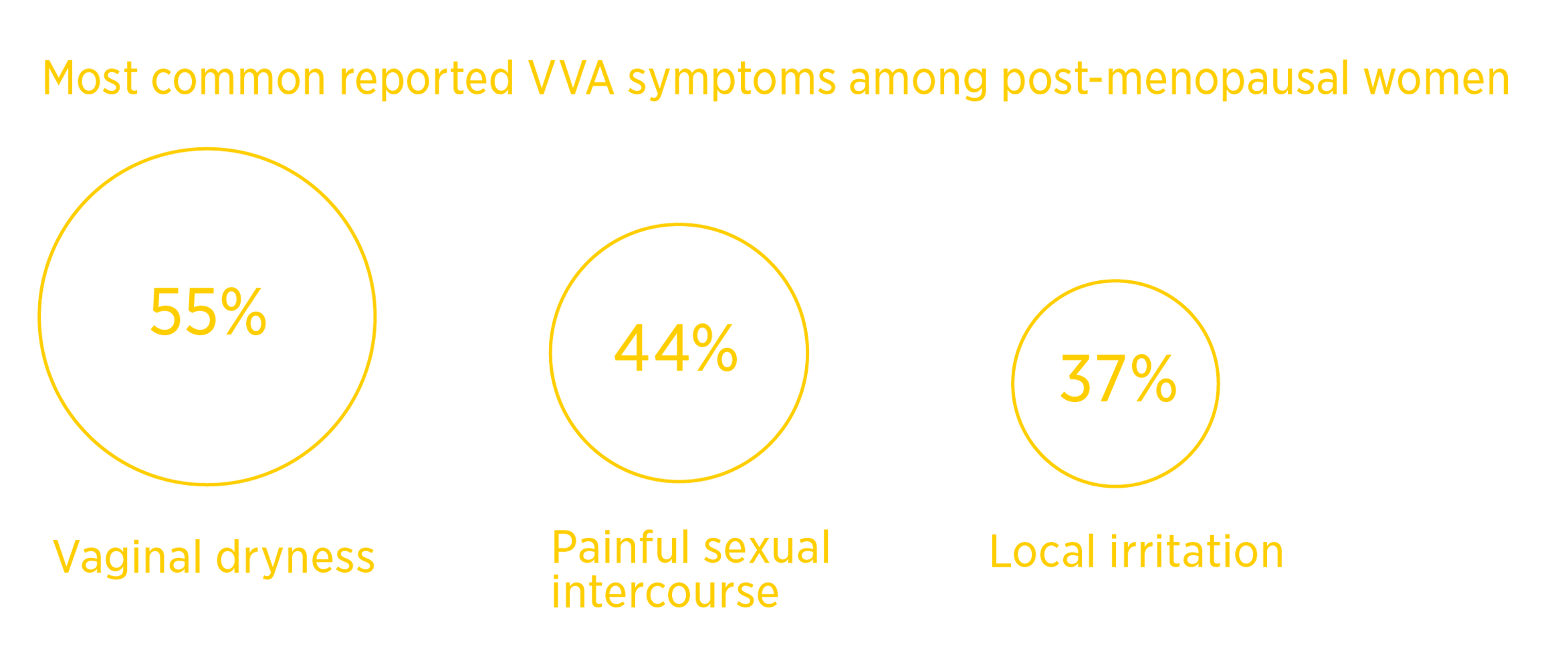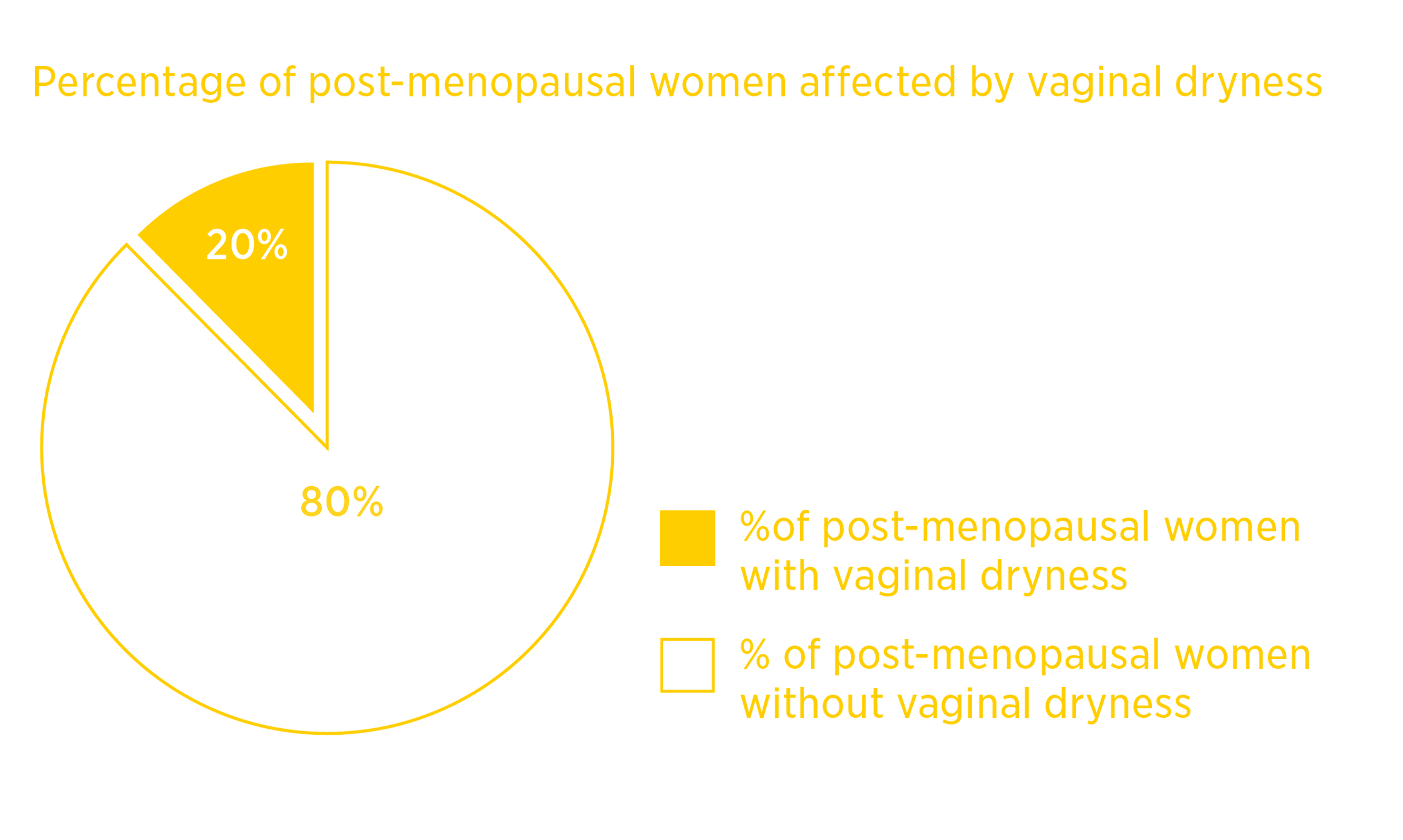
VAGINAL DRYNESS?
We are dedicated to helping women relieve vaginal dryness and atrophy. So we are providing a section to do just that.
Have questions?
Email info@hiphemp.com for your unanswered questions
What are the Symptoms?
Vaginal dryness is a common symptom experienced by women when they go through the menopause transition, but vaginal dryness can happen at any age.
Vaginal dryness is the result of decreased levels of estrogen, the hormone that keeps the lining of the vagina lubricated, thick, and elastic. Vaginal discomfort shows up in ways such as vaginal dryness, irritation, burning & itchiness, amongst other things.
Do you have any of these Vaginal Dryness symptoms?
Pain and spot bleeding during intercourse
Vaginal itching and burning
Thinning pubic hair
UTI infections
What is Vaginal Atrophy?
Vaginal atrophy is described by the Mayo Clinic Staff as the thinning, drying and inflammation of the vaginal walls due to your body having less estrogen. If vaginal atrophy is not addressed, over time the vaginal opening and the vagina itself can narrow and shrink. When vaginal atrophy becomes severe enough, the vaginal walls are prone to injury, bleeding during intercourse or a pelvic exam, burning with urination, more urinary tract infections, and urinary incontinence.

Symptoms of moderate to severe vaginal atrophy:
Vaginal dryness
Vaginal burning
Vaginal discharge
Genital itching
Burning with urination
Urgency with urination
Urinary tract infections
Urinary incontinence
Light bleeding after intercourse
Discomfort with intercourse
Decreased vaginal lubrication during sexual activity
Shortening and tightening of the vaginal canal
Menopause
Normally vaginal atrophy will occur between four to five years after a woman’s last menstrual cycle. When drug-induced menopause is forced then the severity of vaginal atrophy can happen at a faster rate. It is also more likely to be overlooked and under diagnosed by medical professionals.
What Causes It?
Vaginal discomfort shows up in a number of ways, and can be due to number of causes. Understanding the reason behind the discomfort is the first step in treating it.
Look at why you might be experiencing these symptoms, so that you can look at how to go about alleviating them.
The Top Ten Reasons Women experience Vaginal Dryness:
Women’s Natural Cycles
It takes estrogen in the body to help make natural lubrication. During pre-ovulation, a woman’s estrogen levels will rise. Post-ovulation, estrogen levels lower dramatically, which means a woman usually experiences vaginal dryness. However, menstruating women experience vaginal dryness for the three days before and after their period, and many women have the same issue during their periods.
Hormonal Imbalances
Hormonal imbalances are an equal opportunity culprit, which means it can happen at any age. Hormonal imbalances can be caused by antibiotics found in some food, plastics that leach out estrogen-mimicking chemicals, and estrogen-rich foods. Polycystic Ovary Syndrome (PCOS) is a condition that lowers estrogen levels. It takes estrogen to produce the moisture that is released from our vagina during times of arousal.
Smoking
Cigarette smoking can lower estrogen levels in the body, which can lead to vaginal dryness.
Postpartum and Breastfeeding
Although breastfeeding is great for both mother and baby, it does cause pituitary glands to release prolactin, the hormone responsible for producing milk and lowering estrogen levels.
Soaps and Douches
Studies show a significant correlation between vaginal dryness and douching. Douches often include fragrance which can be made up of hundreds of different undisclosed chemicals, some of which can be quite toxic, and others that are associated with allergies. Don’t forget that the vaginal mucous membranes absorb very well. Anything that is put into the vagina will pass through the body. Benzethonium Chloride, a preservative, is commonly used in feminine deodorant sprays, powders and suppositories sold in the United States. Did you know that this same chemical is restricted from use for feminine hygiene products in Canada, Japan, and the EU due to safety concerns? The best way to make sure everything smells good down south is to make sure the vaginal pH balance is where it needs to be, which natural intimate massage oils and vaginal moisture drops like In The Pink encourage.
Chemotherapy and Other Cancer Treatments
Women who undergo life saving treatments from chemotherapy tend to suffer from generalized dryness throughout their bodies, which includes vaginal dryness. Estrogen-fed breast cancer means that the cancer feeds off estrogen. The treatment for this would be to suppress as much estrogen in the body as possible, which means a dryer vagina.
Emotional Stress
We all understand that dealing with a stressful situation can affect our bodies in strange ways. Vaginal health is part of the body, and does not get a “free ride” when dealing with stress. Stress not only affects hormone balance, but also lowers your libido. The ability to achieve an orgasm, and the lack of lubrication can become casualties of stress.
Not Enough Foreplay
There is no rule that explains how much foreplay is needed to stimulate proper lubrication, so it is important to communicate with your partner about what works for you in order to get your juices flowing.
Proper H2O
One key to healthy skin is hydration, and the vagina has some of the most sensitive skin. If dehydration is a struggle, this can lead to itchiness, burning, vaginal pain and insufficient lubrication. The rule of thumb is to drink at least eight 8-ounce glasses of water a day.
Prescription Medications and Birth Control Pills.
Medications such as antidepressants, blood pressure pills, or prescriptions for an overactive bladder, or for excessive sweating are known to cause vaginal dryness. Even over-the-counter antihistamines can dry out more than your sinuses as well.
Birth control from the Pill, vaginal rings or skin patches are designed to manipulate a woman’s body, mimicking the second half of the menstrual cycle, which is low in estrogen and high in progesterone, creating the perfect recipe for lack of lubrication.
Am I The Only One?
Studies show that up to 50 percent of women suffer from a lack of vaginal lubrication. The condition is not limited to menopausal women and can be experienced at any age.
The good news is you’re not alone and this condition is treatable.
Although society is slowly focusing of women’s intimate health issues, there is a long way to go. Studies conducted in 2014 show that of the 64 million postmenopausal women, 32 million suffer from vaginal atrophy. Since women’s intimate problems have been taboo, more than half of these women did not know that their symptoms were caused by menopause or hormonal changes and that their symptoms can be treated and reversed.
Other studies conducted show that nearly three in five women have experienced dryness and painful sex. The problem is that nearly 43% of women who have these symptoms will not reach out, or they do not have a place to turn for advice about age or hormone related changes to their body. Without the comfort of talking about intimate health, some women may not know what is a normal symptom and how to treat it, or when should they stop keeping their secret and talk to someone about an easily treatable problem.
Education and encouragement are just a couple of ways to help make social taboos of women’s intimate health a thing of the past. Vaginal atrophy is a real struggle that many women of all ages face on their own. Women staying silent about this very real problem can not only affect their health but affect their relationships, and quality of life.

Vaginal moisture
Some say thin, dry vaginal and vulvar tissues affect 75% of postmenopausal women. But it’s not just midlife or older women that suffer from vaginal dryness. There are any number of other circumstances that can thin and dehydrate your vagina, such as having a baby, nursing, taking hormonal contraception, being treated for cancer with chemotherapy or radiation, and medications such as anti-histamines or decongestants.
Vaginal moisturizers are used to prepare and heal your vagina so that you can once again enjoy intimate relations. “In the Pink” organic botanical moisturizers restore balance without the use of chemicals. You literally turn back the clock while you sleep. Consider them a daily “vaginal supplement”. “In the Pink” Moisture Drops are a safe and effective choice that just may change your life.
What Can I Do?
Vaginal dryness is treatable. The first goal is to find out what is causing your problem and then come up with a plan to help naturally restore your vagina, whether it is stress relief or making a change in your medications.
Most natural lubricants on the market will provide short-term relief but it is important to find long term relief as well. In The Pink offers a Vaginal Moisture Drop that helps soothe, hydrate and restore your vagina. This perle is rich in Omega 3 and 6 linoleic acid with anti-inflammatory, detoxifying and analgesic properties. This perle is designed to closely mimic your natural lubrication while restoring tissue elasticity.
In The Pink’s Intimate Massage Oils are a lubrication relief crafted from estrogen-free organic ingredients. This botanical blend is crafted to closely mimic a female’s natural lubrication along with the added benefits that essential oils have to offer. If you desire an all-natural product to provide lubrication, moisture, aromatherapy, pain control and enhanced intimate play, this is the lubrication for you.
